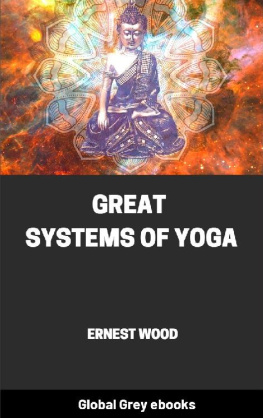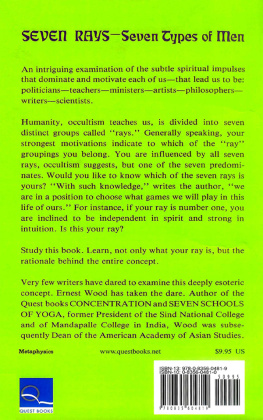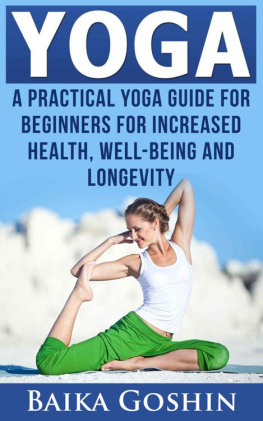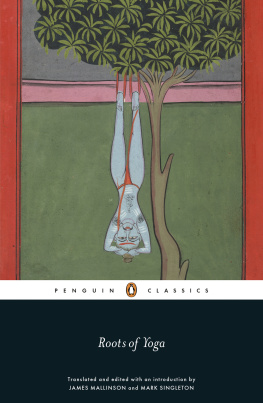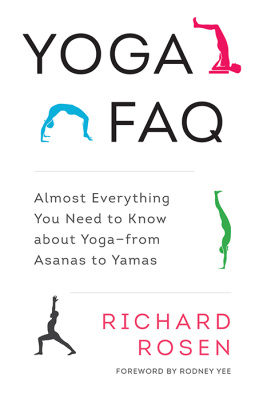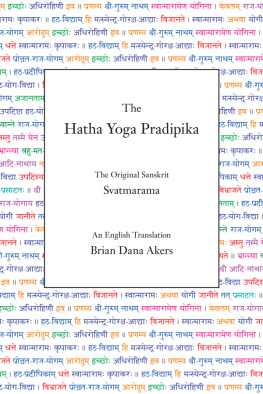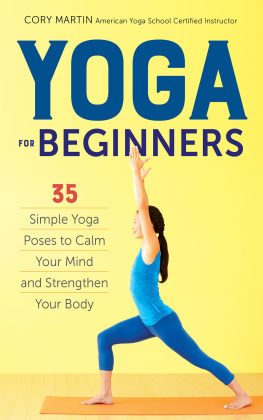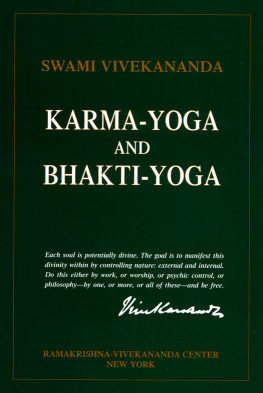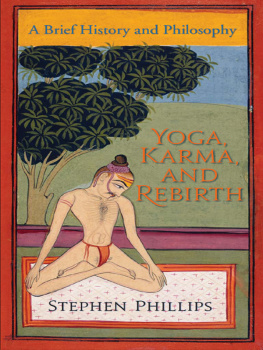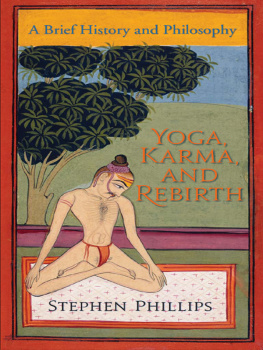Ernest Wood - Great Systems of Yoga (Hinduism)
Here you can read online Ernest Wood - Great Systems of Yoga (Hinduism) full text of the book (entire story) in english for free. Download pdf and epub, get meaning, cover and reviews about this ebook. year: 2019, publisher: Global Grey ebooks, genre: Religion. Description of the work, (preface) as well as reviews are available. Best literature library LitArk.com created for fans of good reading and offers a wide selection of genres:
Romance novel
Science fiction
Adventure
Detective
Science
History
Home and family
Prose
Art
Politics
Computer
Non-fiction
Religion
Business
Children
Humor
Choose a favorite category and find really read worthwhile books. Enjoy immersion in the world of imagination, feel the emotions of the characters or learn something new for yourself, make an fascinating discovery.
- Book:Great Systems of Yoga (Hinduism)
- Author:
- Publisher:Global Grey ebooks
- Genre:
- Year:2019
- Rating:3 / 5
- Favourites:Add to favourites
- Your mark:
- 60
- 1
- 2
- 3
- 4
- 5
Great Systems of Yoga (Hinduism): summary, description and annotation
We offer to read an annotation, description, summary or preface (depends on what the author of the book "Great Systems of Yoga (Hinduism)" wrote himself). If you haven't found the necessary information about the book — write in the comments, we will try to find it.
Great Systems of Yoga (Hinduism) — read online for free the complete book (whole text) full work
Below is the text of the book, divided by pages. System saving the place of the last page read, allows you to conveniently read the book "Great Systems of Yoga (Hinduism)" online for free, without having to search again every time where you left off. Put a bookmark, and you can go to the page where you finished reading at any time.
Font size:
Interval:
Bookmark:
GREAT SYSTEMS OF YOGA
BY
ERNEST WOOD
1954
Great Systems of Yoga By Ernest Wood.
This edition was created and published by Global Grey
GlobalGrey 2019
Get more free ebooks at

globalgreyebooks.com
THERE are many people in America and Europe who want to know what yoga is, and they say, "Do not tell us about the yoga of one particular school; we want a concise survey of the whole field."
This need I have tried to fill in the present small volume. In doing so I have endeavored to preserve the perfect authenticity and clearness of the original teachings of ten different well-known Oriental schools of yoga teaching and practice. This I am doing mainly direct from the original texts and with an extensive knowledge of their actual operation, acquired largely during my thirty-eight-years residence in the East.
Then comes the remark: "We want to find out whether there is anything in these forms of yoga which we can use in our present civilization. Has it anything for us?"
It certainly has. In explanation of this reply, I will first mention that it will be seen by the reader of this book that reflectiveness and meditation play a large part in most of the yoga systems, and then add,
"Half an hour spent in meditation or even in reflection in the morning is not time wasted. It is not even time spent. It is time gained, because it will make the rest of the day far more fruitful than it would otherwise have been."
"How so?"
"It will do this in four ways:
"First, it will co-ordinate the contents of the mind on all aspects of the matters in which you are currently interested, and ensure that nothing is missed or overlooked.
"Secondly, it will permit the rising of new ideas, through the recombinations of old ones, and suggestions arising from them.
"Thirdly, it will exercise the mental faculty, and thus increase both its grip and its grasp, improving its functionality for the whole day, just as the muscular development acquired by ten minutes' exercise in the morning gives the body greater strength for the whole day.
"Fourthly, it will automatically work some of the magic of the mind, whereby you will be put tele-magnetically into touch with things and persons you are interested in, and thus it will create opportunities and even so-called coincidences."
If this is not enough, let us add that it will open new fields of interest, especially those which are concerned with the understanding and right use of life itself.
It will also enrich consciousness itself. Inasmuch as we all enjoy consciousness more than anything else it will be giving us the best of all benefits. There is a story about two men who were talking about a little boy who was licking an ice-cream cone. One remarked that the boy did not like ice-cream. The other, sensing a catch, said he supposed that what was meant by that remark was that what was liked was the taste of the ice-cream. But the reply was that what the boy really liked was only the consciousness of the taste of the ice-cream, and that applies to everything in our lives.
Why should not our subjective faculties be cultivated? We take care of our horses and other animals, and give them proper food, exercise and rest. Why not do the same for our mental facultiesalso for our moral and spiritual ones, too, and that not merely by the way?
But to return to the material practicality of the subject. Thousands of people are breaking down in modern life because they cannot stand the pace. Suppose we can teach them how to keep up the pace of outward modern life but at the same time have such inner calm and poise that they can stand it without strain and fatigue. That is something well worth while, is it not? Well, this is not an idle promise. It is a fact.
But you must be warned. What you gain in yoga must be accompanied by goodwill towards others and the wish that they also may benefit in some way by your increased knowledge and power. Without this there will be a recoil on your head, just as sure as the magic of the magnetism of thought operates to benefit you. But that is no hardship, is it, when we all know full well in these enlightened days that there is no true pleasure in life when our neighbors or companions are suffering, and indeed almost the greatest of all pleasures is to see others happy. This nature of ours is not merely negative and concerned with sympathy for the suffering. It is also positivethe enjoyment of the happiness of others. Is that not why people like a peaceful country scene? As one lady remarked a few days ago: "How much nicer the meadow is now that the cows are in it!"
In the present world crisis most of us are concerned not so much with the idea that a bomb may fall on our own headswe would rather it did so than on the heads of those near and dear to us, or on any considerable number of people anywhere. We are very much concerned about the plight of humanity in general. We rejoice over the prosperity of the average family of today, and we quake to think that it may be destroyed and an age of torment and slavery may engulf it. We think of the welfare of the children and the aged, and most of us would not enjoy a personal prosperity built upon the sufferings of these.
These are matters which yoga also puts before us, studies and explains, so that we learn that happiness is a matter not merely of physical, emotional and mental health and strength, and these in balanceno small matterbut of social and moral and ethical health and balance also, and even something more of which we know only the rudiments now, namely that which we call the spiritual self, from the consecration by which all the invigoration of our powers proceeds.
Let us be definite and certain about this. If by some personal suffering or loss you could stop for good and all the sort of war that took place in Koreastop the maiming and killing of unbelligerent men, stop the ruin and slaughter of gentle people, the populations of admirable lands of ancient culture, such as Korea washow far would you go in that loss and suffering? Most people would go to the limit. Does this not tell us that it is ability we lack, not love of our fellowmen? We are held back by helplessness, not by selfishness. If the issue could be squarely put, how many would shrink from the supreme sacrifice? Very few. It is the sort of thing Tom Paine asked the people of the American Colonies to do when George Washington was on the wrong side of victory, and most of them held off through that helpless feeling, but there were enough responses to turn the tide, and ensure the material establishment of a grand set of social ideals which are again in danger today.
Washington acted much because he had thought and felt much. We do not think enoughthat is what is the matter. Let us have some practice and more know-how in thinkingthat is what yoga can give to every one. Not to make the opposite error, to sink ourselves in thought, as some have done, but to invigorate and rationalize the whole of living by the awakening of more of man-ness in our minds.
The man-ness of man is constantly being surrendered to externals. This is one of the warnings of the yoga theoreticians. By a curious paradox of our life, the very service of mammon, as we may call it, is often the one thing which calls the man-ness of man into activity. I must explain. The human body has its more or less permanent set-up, with a group of pains and pleasures geared to its activities and designed primarily to warn it against dangers and tempt it into healthful activities, which have for the most part become automatic. When, for example, the needs of the body are satisfied with food, the natural appetite dies away for the time being, and if it is then stimulated artificially by exciting spices pain will arise after some time and tend to stop that excess. To correct this and numerous other troubles the man-ness of the man, in the shape of his power of thought and affection is aroused. But it is rather a pitiful situation that the man-ness of the man should be awakened and operated for such negative reasons, when it is really the activity of that man-ness which is the chief possibility of enjoyment in human life.
Next pageFont size:
Interval:
Bookmark:
Similar books «Great Systems of Yoga (Hinduism)»
Look at similar books to Great Systems of Yoga (Hinduism). We have selected literature similar in name and meaning in the hope of providing readers with more options to find new, interesting, not yet read works.
Discussion, reviews of the book Great Systems of Yoga (Hinduism) and just readers' own opinions. Leave your comments, write what you think about the work, its meaning or the main characters. Specify what exactly you liked and what you didn't like, and why you think so.

